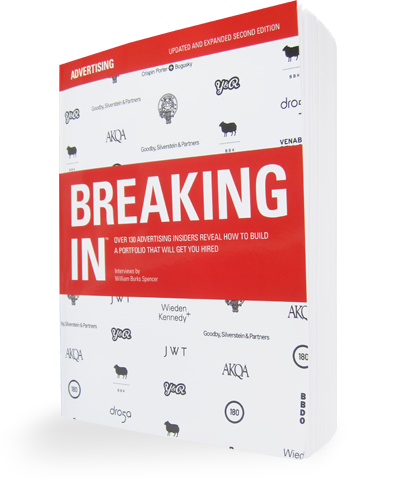Check out some great work from Ant Keogh.
What do you look for in a student portfolio? And what impresses you?
I suppose it’s looking at things in a different way. Solving a problem with a different angle than most people would come up with and yet one that’s still somewhat practical. An imaginative approach is what you’re initially looking for, although if you get completely crazy ideas without any sense of practicality then that’s too easy. Because advertising is that mix of lateral and logical thinking. Worse though is if it’s too buttoned down, because it’s easier to teach that than to teach raw creative instinct. You want to turn each page and say, “Great idea, great idea, great idea.” And it doesn’t matter if they are pencil drawings or the most simple version of an idea, if that idea shines through. But you just want to see a succession of them so you get a sense for their “strike rate” in problem solving.
[ … ]
Can you think of any remarkable portfolios that you’ve seen?
No. I can’t recall any incredible portfolios, apart from the senior people. At the junior end they all have a mixture of good work, okay work, and often some bad work. The people we’ve employed have had, in comparison to all the others, pretty good folios. And then it also does come down to the person. If their work is pretty damn good then we take a chance on them if they just feel like they have what it takes and will be able to do it. I hope that’s not discouraging. It probably should be encouraging because it shows that a folio doesn’t have to be perfect, it just has to show a lot of promise.
[ … ]
Are there common mistakes that you see?
The mistake I see the most is not one that is so easy to fix, which is that the tone is often just a little off. It just doesn’t show an understanding of human psychology and it’s just off the mark. And I guess that’s something that comes with experience or innate ability. But that’s the talent: to do something that’s appealing on a human level. It’s like they are not emotionally mature enough to see that or something. Or they’ve gotten too caught up in the brief. Or it’s boring. That’s the big one, but then everyone has that problem. We all fight that day to day. But it’s being able to see that, it’s the difference between someone who’s a professional and someone who’s not. At least if you know it’s boring, that’s a start.
[ … ]

Ant Keogh

Comments are closed.